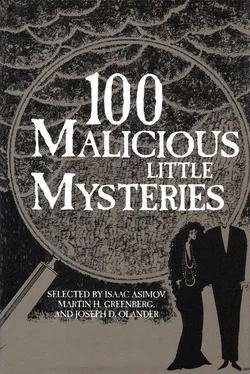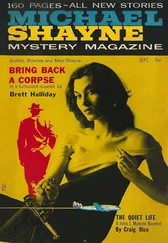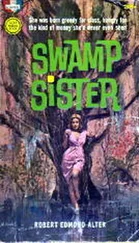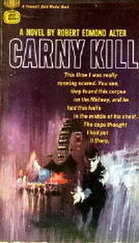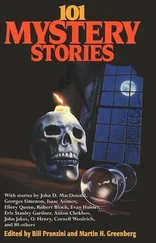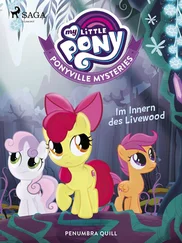About once a week he’d hold what he called a strategy meeting. We’d all crowd into his private office. He’d do most of the talking, outlining company policies and telling us about his foggy future plans. Rosemary, at least, was entitled to a chair at these boring lectures. But I, being the youngest of the editorial staff, usually found myself sitting on the thick green rug that covered the floor.
It was obvious to me from the start that Rosemary and Mason hated each other. Rosemary hated him because he was the only person who stood between her and a place to which she could advance. Mason hated her because he knew her feelings and desires for the vice presidency of Neptune Books. Of course, he couldn’t fire her. By that time, Rosemary’s word was gospel and her every decision went unquestioned. It was the old law of the jungle: Eat or be eaten.
We all knew that Mason was waiting for her to make just one mistake, but she never made it. The sales figures kept climbing and Rosemary kept on with her necromancy on paper at her desk. Pretty soon it got so that even a poor title sold a half-million copies — and a million-copy sale was considered just average. Rosemary would dash into my office holding a hard-cover edition of some cheap novel that hadn’t sold three thousand copies in the trade edition — and she’d insist we reprint it in soft covers. We’d argue that it hadn’t sold well at all, but she’d simply say: “That’s all the more readers left for us.” Of course, we’d finally agree; and, of course, the book would sell around two million copies.
By the time I’d been there six months, my friendship with Rosemary had increased to the point where I was taking her to lunch a couple of times a week. It was at one of these luncheon dates, in a little French place off Fifth Avenue, that I finally persuaded her to tell me the secret of her fantastic skill.
“Well,” she said, “I’ve never told this to any of the other vultures, but somehow you’re different.” I thanked her quickly and she went on: “It’s all done by figuring the percentage of incidents. It took me nearly five years to work out a sort of slide-rule mathematical equation. I’ve discovered that it’s mathematically possible to cause any two objects to meet at a given time and place, provided you know enough about these objects and can exercise enough control over one of them. I aim one angle of incidence to meet another angle of incidence. Result? Co-incidence!”
It sounded even more fantastic to me, but I didn’t interrupt.
“In the case of distribution,” she went on, “I figure out just where and when the supply and demand will meet, I send books to that spot — and people buy them. It’s that simple.”
I shook my head and asked for more details.
“Look,” she said, “figuring mathematically that five hundred people in Chicago will want one of our new mysteries next Tuesday, I see that that many books get out there. That’s all; my equation works it all out for me. It means getting the books to exactly the spot where the consumer is when he decides he wants that certain book.”
Her eyes drooped as she added ominously: “I can do the same thing with any two objects, knowing enough about them.”
“Why did you choose publishing?”
“I knew it was the best way for me to get to the top fast. The big drawback in publishing has always been, it seems to me, that the books aren’t around at the exact instant that most people want to buy them. By the time they see the book they wanted, the purchasing desire has decreased. Put the books into their hands when their purchasing desire is at its peak, and you’ve got sales.”
“And you say you can do this with other things as well?”
“Certainly. Did you ever stop to think that when a man gets hit with an automobile it’s because both of them have come together at exactly the same time and place by a chain of events? Think of the millions of events, all unconnected, that have resulted in their coming together.”
“And you claim you can control some of these events.”
“ Some of them. I can make calculations. If I can control some of the fractional events, I can bring man and book, or man and automobile, together.”
She looked so serious that I laughed a little. “With that sort of power, you can control destiny.”
She didn’t laugh. “Yes, I suppose I could...”
The conversation ended there. Going back to work, I pushed the incident to the back of my mind. We had to line up some strong sellers — five-million-copy sellers — for the big Christmas trade, and I was busy fighting with publishers for rights.
It was one afternoon around four that Rosemary and Mason had their last big fight. It was over a policy matter, concerning exactly what type of books we should concentrate on; and Mason, for once, wouldn’t listen to Rosemary.
“I’m still in charge here,” he told her sharply. “You haven’t got my job yet. And if I have anything to do with it, you won’t get it either; I’ll keep it if I have to live to be a hundred.”
Rosemary’s bony face looked frostbitten. She said nothing in return; she simply retreated to her tiny office. I thought that the whole thing had blown over until, a few days later, I happened to walk in and found her gazing out the window, making careful notes on a memo pad. When I asked her what she was doing, she was too absorbed to reply. But I had seen enough to know, anyway.
Rosemary was timing the traffic light on the corner of Fifth Avenue and Forty-seventh Street and ticking off the number of cars that passed.
In the days that followed, I caught her looking out the window several times, writing figures, timing automobiles as they rounded the corner. And she began watching Mason closely, too. He always left the office at three minutes to five. He was the kind of punctual man you could set your watch by; he always walked down the two flights of stairs, rather than wait for the elevator.
Rosemary began staying late at the office, until after Mason left. Then she would run to the window and time him as he left the building and crossed Forty-seventh Street on his way to Grand Central Terminal.
I told myself it was all sheer nonsense, but still...
It was on a Friday night, just before five, that she stepped from her office, stood in the hall and called to Mason as he was leaving. He frowned and walked over to her, glancing at his watch; she started discussing some quite irrelevant matter about a wholesaler out in California.
I glanced at the big wall clock as they talked, and I was aware that Rosemary was watching it, too. Finally, when they’d been talking for exactly fifty-five seconds, she suddenly cut the conversation short and retreated to her office, closing the door. Hastily Mason went down the stairs to the street.
I went to my own window and looked out. Slowly but surely an odd feeling crept over me. I wanted to shout out to Mason, to warn him — but I remained numb. What would I be trying to save him from?
I watched him come out of the building and start across the street.
He was halfway across, when a taxi rushed around the corner and struck him head on...
Well, shortly after Mason’s funeral, word came from the big boss that Rosemary was now vice president of Neptune Books. We were all happy for her, of course, but it wasn’t long after that that I left Neptune and went back to my old job on a true-crime magazine.
Oh, I know the whole thing is fantastic, and that Mason’s death was just a coincidence, but still I felt a chill about staying around here, near Rosemary.
Suppose I’d fallen hard for her and asked her to marry me. And she accepted. I’d spend the rest of my life wondering when she was going to stop me and talk to me for exactly fifty-five seconds!
Читать дальше
